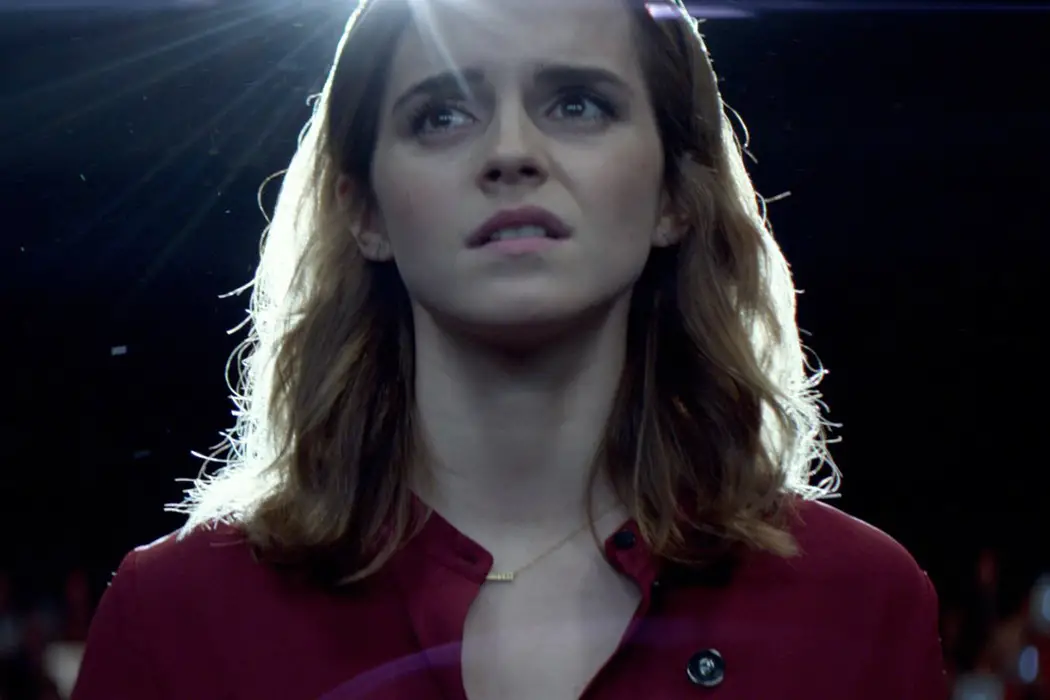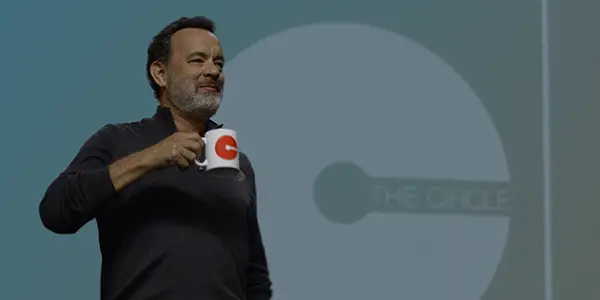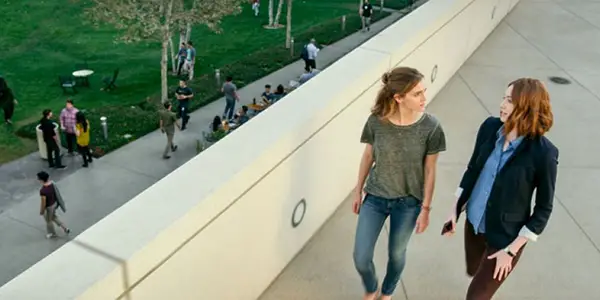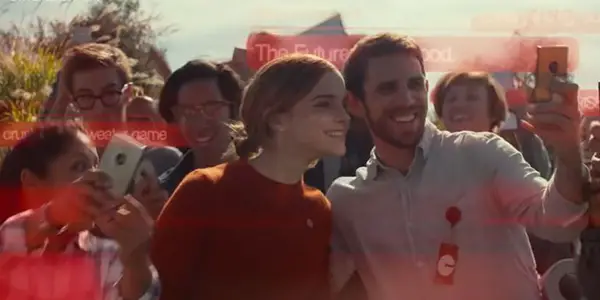THE CIRCLE: More Obtuse Than Well-Rounded

David is a film aficionado from Colchester, Connecticut. He enjoys…
Science fiction, as a genre, succeeds best when it reflects not only on the future, but on the present. Writers and filmmakers grasp a hold of a concept which might already exist, and then stretch it to a fitting, yet often terrifying conclusion. In some cases, the work can be eerily prophetic when looking back years later, proving that the outcome wasn’t too far-reaching to begin with.
Such a concept is reflected in Dave Eggers‘ 2013 novel The Circle, from which the current film of the same name is adapted. The story takes the idea of social media and digital networks and stretches it into a world where not only is privacy scarce, but is soon seen as outside the norm. It’s a scary concept, and one that seems to be coming more and more true with each new Apple and Google product.
Due to its much-shorter length than Eggers’ dense novel, it clearly shouldn’t be expected that James Ponsoldts’ film adaptation The Circle would be a carbon copy of the book (which I had a chance to read before seeing the movie); yet, in attempting to shove together too many major details, it suffers greatly from underdeveloped characters and motives, and as a result becomes a really flimsy attempt at satire. It’s a movie that, though timely, needed a great deal more work between its original source and adaptation.
The Circle
In the not-too-distant future, the marketplace of digital technology and social media has become over-saturated. As a way to counter this issue, a mega-conglomerate company is formed called The Circle, which comes to consume all the major existing networks, including: Facebook, Twitter, Instagram, YouTube, Google, Apple, and countless others. Now, a person needs only one Circle profile, and they have the entire world at their fingertips.

Mae Holland (Emma Watson) is a recent college graduate working a dead-end customer help job. Through a friend she knew in college named Annie (Karen Gillan), she lands an interview with The Circle, eventually landing a job yet again in customer service (you have to start somewhere). After an incident, she soon comes face-to-face with the two men who started the company, Eamon Bailey (Tom Hanks) and Tom Stenton (Patton Oswalt), who discuss with Mae the potential future of her role in the company.
She is soon conflicted between following the advice of the two men or, instead, to listen to vague statements from a mysterious man named Kalden (John Boyega), who warns Mae about The Circle’s true underlying purpose.
So many characters, so little time
It all sounds good on paper, and indeed, at times seems to be headed in the right direction. The first introduction to The Circle’s major technology, for example, in which Eamon Bailey explains new mini-cameras that they have been putting up all around the world, is both oddly compelling and horrifying (and also gives Tom Hanks his one real chance to shine, in a scene that allows him to express his everyman persona to full capacity). The introduction to the campus of The Circle is also beautifully filmed, if a bit short-lived, coupled by the digitized sounds of Danny Elfman‘s subtly effective score.
What soon becomes evident, though, is that The Circle doesn’t quite know what to do with the material from which it is based on. Having been lucky enough to have read the book in advance, I was able to fill in the gaps that the movie leaves open, forming a fuller picture of what occurs. Yet, for much of the audience who didn’t have a chance to read Dave Eggers‘ book, the film must have been at least somewhat confusing. The character of Kalden, for example (played by Boyega), has a much more prominent role in the novel, yet in the film is given only minutes to have the same effect, in the end becoming an obscure character whose purpose in the story is hazy at best.

Additional story-lines and characters, such as those played by Ellar Coltrane and Patton Oswalt, are lost in a similar manner, by the end either not given much of a chance to show their purpose in the case of Oswalt, or fading by the wayside in the case of Coltrane, a love interest of Mae’s who appears early on in the film, only to disappear but then pop up later in what could have been an immensely climactic moment, that instead feels squandered.
This is also, sadly enough, the final role for the late-great Bill Paxton, who plays Mae’s father, a man suffering from multiple sclerosis. Though Paxton himself is fine, I couldn’t help but feel that his character had little impact, especially since it is his disease and the thought that The Circle could help that becomes one of the reasons Mae hops aboard anything the company throws in her direction.
The (slightly) good
Oddly enough, the one key difference between the book and the movie is the portrayal of the character of Mae. In the novel, she’s often sluggishly dull, with nary a word to say, outspoken by the more interesting characters around her (a common practice in books for a protagonist, but in this case brutally frustrating). In the film, though, she’s given at least a touch of charisma, finely tuned by Emma Watson, who hits the film’s hard emotional moments in addition to its nuances. She’s also, thankfully, rewritten as a character that at least slightly questions her actions and the motives of The Circle, an aspect which is nearly nonexistent in the novel (and by its conclusion, made me openly despise Mae as a human being).

In addition to Watson, the only other real standout role here is Karen Gillan, who portrays Annie. Though slightly different in appearance (she’s supposed to be a blonde from America, but here is red-haired and Scottish), yet she is still just as animated as played by Gillan, with the highlights of the film often being the eye-opening conversations between her character and Watson‘s.
Spins, but goes nowhere
Where The Circle really drops off, though is, fittingly, related to where we started. Much as The Circle itself attempts to combine several different social and technological networks under one mega-conglomerate roof, the film also attempts to mesh together too many thematic elements. The overarching relation between the themes, as you may have guessed, is related to privacy.
The film spits out details about why transparency is better than privacy: the ability to expose human rights violations, less corruption in government, drops in crime rate, etc. The methods to get here are also shown through many familiar technologies, such as drones, hidden cameras, and, eventually, a mini-camera that you wear on your person, allowing the entire world to log in and see your actions at any given moment.
The idea presented here is expressed by Tom Hanks‘ character at one point, who explains that “When we are our best selves, the possibilities are endless.” To be our best selves, he further explains, is to always act as if somebody is watching you (which they now will be). It’s a scary concept, but one that it is not utilized to its full potential. For example, we hear almost nothing in the film about how these cameras have helped the world, or about how the government will be changed in relation to this new technology.

Further, just how drastically will your life change if your every moment was presented for the world to see? Though presented in the film in a fun-to-watch format, with varying snippets of messages popping up alongside the screen as we see people responding to the perspective of a personal camera, it’s still not nearly enough to be effective, especially considering the hard-hitting ramifications that such a practice could lead to.
There is at least a slight hint later on, though, at the potential harm that the overabundance of cameras could cause. Yet, in a real head-scratcher of a move, the film then proceeds from this moment in a completely illogical direction, concluding with a final shot that, to me, turned the movie on its head, and not in a fitting way. It’s a real “huh?!” kind of moment, and not one that helped a film which had already been severely lacking in positive attributes.
Conclusion
To conclude, The Circle is a film that, by all means, should have worked: it is directed by James Ponsoldt (The End of the Tour, Smashed, The Spectacular Now), contains a fine cast, including Emma Watson, Tom Hanks, John Boyega, and Karen Gillan; and, in addition, imbues timely themes of surveillance, privacy, and the fear of a potential future that the over-saturation of social networking could lead to. Yet, in part due to a shoddy translation from book to screen, and little effort spent on expanding its themes in compelling ways, The Circle instead feels like lost potential. It is (excuse the use of one more pun) a misshapen mess.
What did you think of The Circle? What are some of your favorite recent book-to-movie adaptations?
The Circle was released in the US on April 28. For all international release dates, click here.
Does content like this matter to you?
Become a Member and support film journalism. Unlock access to all of Film Inquiry`s great articles. Join a community of like-minded readers who are passionate about cinema - get access to our private members Network, give back to independent filmmakers, and more.
David is a film aficionado from Colchester, Connecticut. He enjoys writing, reading, analyzing, and of course, watching movies. His favorite genres are westerns, crime dramas, horror, and sci-fis. He also enjoys binge-watching TV shows on Netflix.













